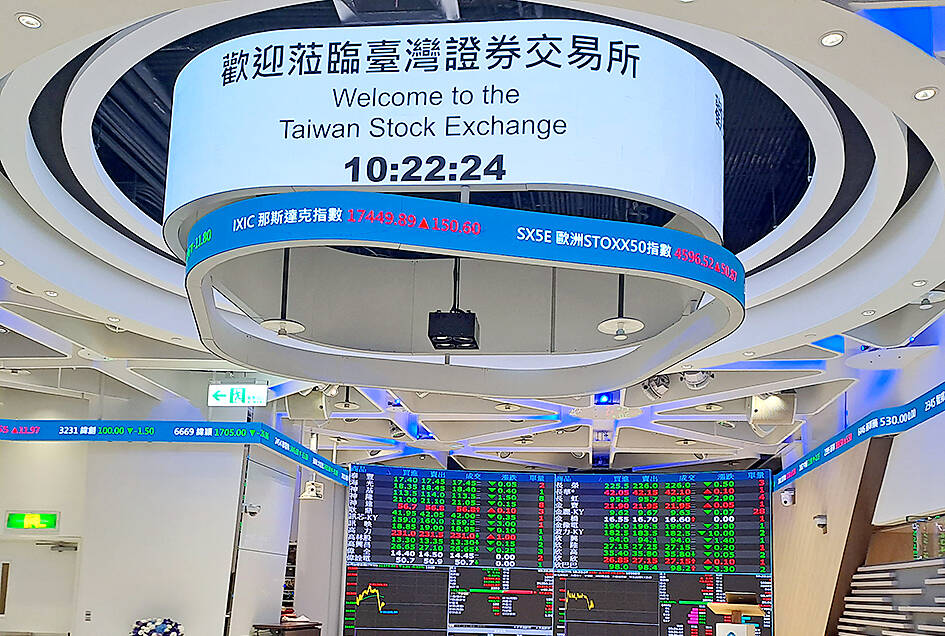Equity markets were mixed yesterday, as nervous investors braced for US President Donald Trump’s wave of tariffs later in the day, with speculation about what he has in store stoking uncertainty on trading floors.
Shares in Taiwan closed slightly higher as investors appeared reluctant to chase prices amid lingering concerns over the fresh round of tariffs imposed by the Trump administration.
The TAIEX closed up 18.05 points, or 0.08 percent, at 21,298.22.

Photo: CNA
Taiwan Semiconductor Manufacturing Co (TSMC, 台積電), the most heavily weighted stock in the TAIEX, fell 0.21 percent to close at NT$942.
“TSMC has recently faced headwinds largely due to tariff scares rather than anything to do with its fundamentals,” MasterLink Securities Corp (元富證券) analyst Tom Tang (湯忠謙) said. “Investors just do not like such uncertainties.”
Elsewhere in Asia, Tokyo, Shanghai, Sydney, Wellington, Manila, Mumbai and Bangkok also rose, while Singapore and Seoul slipped with London, Paris and Frankfurt at the opening. Hong Kong barely moved.
Equities have been battered leading up to Trump’s latest announcement of reciprocal tariffs as the ongoing uncertainty was spooking markets.
The US president’s “Liberation Day” tariff plans have ramped up fears of a global trade war after several countries warned they were lining up their responses, and economists have warned that economic growth could take a hit and inflation reignite, dealing a blow to hopes that central banks would continue cutting interest rates.
Bank of Japan Governor Kazuo Ueda said US tariffs could have a significant impact on trade activity in affected nations.
“Depending on the size and area of the tariffs, it is possible they will have a large impact on trade activities among nations,” Ueda yesterday said in response to questions in parliament.
“Another big point is how household and business sentiment will be affected by them, influencing overall spending,” he added.
Ueda’s remarks suggest he continues to monitor developments while refraining from offering any hints as to whether he is become more or less cautious over the central bank’s rate hike path.
Meanwhile, Australian Prime Minister Anthony Albanese and his rival in next month’s election, Liberal Party leader Peter Dutton, said they would stand up for the country’s national interests in the face of looming US tariffs that could hit Australian beef.
Europe will respond to the likely implementation of tariffs by Trump in a proportionate manner, but will not escalate tensions under any circumstances, French Minister for Industry and Energy Marc Ferracci said yesterday.
“Europe has always been on the side of negotiation and calming things down, because trade wars, you know, only produce losers,” Ferracci told RMC radio.
As the world braces for Trump’s rollout of reciprocal tariffs, Vietnam said it plans to send another top official and business delegation to the US this weekend.
Thailand pledged to import more US energy and food products, while Mexico said there would be no “eye for an eye” approach to US tariffs.
Additional reporting by CNA, Bloomberg and Reuters

CHIP RACE: Three years of overbroad export controls drove foreign competitors to pursue their own AI chips, and ‘cost US taxpayers billions of dollars,’ Nvidia said China has figured out the US strategy for allowing it to buy Nvidia Corp’s H200s and is rejecting the artificial intelligence (AI) chip in favor of domestically developed semiconductors, White House AI adviser David Sacks said, citing news reports. US President Donald Trump on Monday said that he would allow shipments of Nvidia’s H200 chips to China, part of an administration effort backed by Sacks to challenge Chinese tech champions such as Huawei Technologies Co (華為) by bringing US competition to their home market. On Friday, Sacks signaled that he was uncertain about whether that approach would work. “They’re rejecting our chips,” Sacks

Taiwan’s long-term economic competitiveness will hinge not only on national champions like Taiwan Semiconductor Manufacturing Co. (TSMC, 台積電) but also on the widespread adoption of artificial intelligence (AI) and other emerging technologies, a US-based scholar has said. At a lecture in Taipei on Tuesday, Jeffrey Ding, assistant professor of political science at the George Washington University and author of "Technology and the Rise of Great Powers," argued that historical experience shows that general-purpose technologies (GPTs) — such as electricity, computers and now AI — shape long-term economic advantages through their diffusion across the broader economy. "What really matters is not who pioneers

In a high-security Shenzhen laboratory, Chinese scientists have built what Washington has spent years trying to prevent: a prototype of a machine capable of producing the cutting-edge semiconductor chips that power artificial intelligence (AI), smartphones and weapons central to Western military dominance, Reuters has learned. Completed early this year and undergoing testing, the prototype fills nearly an entire factory floor. It was built by a team of former engineers from Dutch semiconductor giant ASML who reverse-engineered the company’s extreme ultraviolet lithography (EUV) machines, according to two people with knowledge of the project. EUV machines sit at the heart of a technological Cold

TAIWAN VALUE CHAIN: Foxtron is to fully own Luxgen following the transaction and it plans to launch a new electric model, the Foxtron Bria, in Taiwan next year Yulon Motor Co (裕隆汽車) yesterday said that its board of directors approved the disposal of its electric vehicle (EV) unit, Luxgen Motor Co (納智捷汽車), to Foxtron Vehicle Technologies Co (鴻華先進) for NT$787.6 million (US$24.98 million). Foxtron, a half-half joint venture between Yulon affiliate Hua-Chuang Automobile Information Technical Center Co (華創車電) and Hon Hai Precision Industry Co (鴻海精密), expects to wrap up the deal in the first quarter of next year. Foxtron would fully own Luxgen following the transaction, including five car distributing companies, outlets and all employees. The deal is subject to the approval of the Fair Trade Commission, Foxtron said. “Foxtron will be